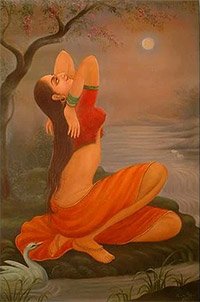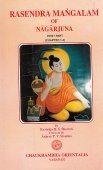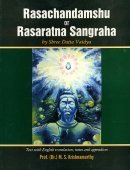Dhatuvada, Dhātuvāda, Dhatu-vada: 12 definitions
Introduction:
Dhatuvada means something in Hinduism, Sanskrit, the history of ancient India, Marathi. If you want to know the exact meaning, history, etymology or English translation of this term then check out the descriptions on this page. Add your comment or reference to a book if you want to contribute to this summary article.
In Hinduism
Ayurveda (science of life)
Source: gurumukhi.ru: Ayurveda glossary of termsDhātuvāda (धातुवाद):—Transmutation of lower metals into noble metals

Āyurveda (आयुर्वेद, ayurveda) is a branch of Indian science dealing with medicine, herbalism, taxology, anatomy, surgery, alchemy and related topics. Traditional practice of Āyurveda in ancient India dates back to at least the first millenium BC. Literature is commonly written in Sanskrit using various poetic metres.
Kavya (poetry)
Source: OpenEdition books: Vividhatīrthakalpaḥ (Kāvya)Dhātuvāda (धातुवाद) in Sanskrit (or Dhāuvāiya in Prakrit) refers to the “art of obtaining metals”, as is mentioned in the Vividhatīrthakalpa by Jinaprabhasūri (13th century A.D.): an ancient text devoted to various Jaina holy places (tīrthas).
Source: Brill: Śaivism and the Tantric Traditions (kavya)Dhātuvāda (धातुवाद) refers to “alchemy”, according to Bāṇa’s Kādambarī (p. 226).—There are apparently several Tantric rites that Bāṇa pejoratively associates with the priest: [...] “he had written down the [work known as ] the ‘Doctrine of Mahākāla’ instructed to him by a withered Mahāpāśupata mendicant”; “he was one in whom the disease of talking about [finding] treasure had arisen”; “in him the wind [disease] of alchemy (dhātuvāda) had grown”; “he entertained the deluded desire of becoming the lover of a Yakṣa maiden”.

Kavya (काव्य, kavya) refers to Sanskrit poetry, a popular ancient Indian tradition of literature. There have been many Sanskrit poets over the ages, hailing from ancient India and beyond. This topic includes mahakavya, or ‘epic poetry’ and natya, or ‘dramatic poetry’.
Kama-shastra (the science of Love-making)
Source: Shodhganga: Elements of Art and Architecture in the Trtiyakhanda of the Visnudharmottarapurana (kama)Dhātuvāda (धातुवाद) refers to “knowledge of metals” and represents one of the “sixty four kinds of Art”, according to the Kāmasūtra of Vātsyāyaṇa.—Indian tradition, basically includes sixty four Art forms are acknowledged. The references of sixty four kinds of kalā are found in the Bhāgavatapurāṇa, Śaiva-Tantras, Kāmasūtra of Vātsyāyaṇa etc.

Kamashastra (कामशास्त्र, kāmaśāstra) deals with ancient Indian science of love-making, passion, emotions and other related topics dealing with the pleasures of the senses.
India history and geography
Source: Singhi Jain Series: Ratnaprabha-suri’s Kuvalayamala-katha (history)Dhātuvāda (धातुवाद) refers to the “art of making artificial gold” and represents one of the various Siddhis (powers) practiced in ancient India, as mentioned in the Kathās (narrative poems) such as Uddyotanasūri in his 8th-century Kuvalayamālā (a Prakrit Campū, similar to Kāvya poetry).—Page 191.28-32: Here is a reference to various Siddhis practised in medieval times, [for example, Dhātuvāda]. [...] We get some details about Dhātuvāda (p. 195), i.e., the art of making artificial gold, being practised in a secluded part of the Vindhya forest. It is said that the red colour of flames of the fire indicated the making of copper, yellow of gold, white of silver, black of iron and colourless of bronze. Others thought that its true technique was an unknown secret. If the fire is of lower heat, lead was produced, but if the heat became excessive, then granular gold was manufactured. If the fire was of moderate heat, the metallic contents of the crucible just drained in liquid form. If the flame was greasy, the contents would turn black. After putting the requisite content in the crucible, some kind of herbal powder was added.
It is said that the assembled Dhātuvādins or alchemists were failing in their attempt. Prince Kuvalayacandra tried his own knowledge and succeeded in the making of gold. It appears that one of the epithets of the Dhātuvādins was Narendra, maning a master of charms or antidotes. The word is also used in this sense in classical Sanskrit literature. Dhātuvāda is also called Narendrakalā (Ṇariṃdakalā, 197.16).

The history of India traces the identification of countries, villages, towns and other regions of India, as well as mythology, zoology, royal dynasties, rulers, tribes, local festivities and traditions and regional languages. Ancient India enjoyed religious freedom and encourages the path of Dharma, a concept common to Buddhism, Hinduism, and Jainism.
Languages of India and abroad
Marathi-English dictionary
Source: DDSA: The Molesworth Marathi and English Dictionarydhātuvāda (धातुवाद).—m S Mineralogy or chemistry.
Marathi is an Indo-European language having over 70 million native speakers people in (predominantly) Maharashtra India. Marathi, like many other Indo-Aryan languages, evolved from early forms of Prakrit, which itself is a subset of Sanskrit, one of the most ancient languages of the world.
Sanskrit dictionary
Source: DDSA: The practical Sanskrit-English dictionaryDhātuvāda (धातुवाद).—
1) mineralogy, metallurgy.
2) alchemy.
Derivable forms: dhātuvādaḥ (धातुवादः).
Dhātuvāda is a Sanskrit compound consisting of the terms dhātu and vāda (वाद).
Source: Cologne Digital Sanskrit Dictionaries: Cappeller Sanskrit-English DictionaryDhātuvāda (धातुवाद).—[masculine] metallurgy, mineralogy.
Source: Cologne Digital Sanskrit Dictionaries: Monier-Williams Sanskrit-English DictionaryDhātuvāda (धातुवाद):—[=dhātu-vāda] [from dhātu > dhā] m. metallurgy, alchemy, [Kādambarī]
[Sanskrit to German]
Sanskrit, also spelled संस्कृतम् (saṃskṛtam), is an ancient language of India commonly seen as the grandmother of the Indo-European language family (even English!). Closely allied with Prakrit and Pali, Sanskrit is more exhaustive in both grammar and terms and has the most extensive collection of literature in the world, greatly surpassing its sister-languages Greek and Latin.
Kannada-English dictionary
Source: Alar: Kannada-English corpusDhātuvāda (ಧಾತುವಾದ):—
1) [noun] = ಧಾತುವಿಜ್ಞಾನ [dhatuvijnana].
2) [noun] the supposed art of changing base metals into gold.
Kannada is a Dravidian language (as opposed to the Indo-European language family) mainly spoken in the southwestern region of India.
See also (Relevant definitions)
Partial matches: Dhatu, Vada, Vata.
Ends with: Shaddhatuvada.
Full-text: Dhatuvadin, Dhatu, Dhatuwaad, Narimdakala, Narinda, Narendrakala, Dhauvaiya, Alchemist, Artificial gold, Narendra, Devataradhana, Mantrasiddhi, Siddhi, Bilapravesha, Metal, Nidhivada, Rasashastra, Causashtakala.
Relevant text
Search found 10 books and stories containing Dhatuvada, Dhatu-vada, Dhātu-vāda, Dhātuvāda; (plurals include: Dhatuvadas, vadas, vādas, Dhātuvādas). You can also click to the full overview containing English textual excerpts. Below are direct links for the most relevant articles:
Kavyamimamsa of Rajasekhara (Study) (by Debabrata Barai)
Part 6.1e - Nihnutayoni (2): Parapurapraveśasadṛśa < [Chapter 5 - Analyasis and Interpretations of the Kāvyamīmāṃsā]
Part 6.1a - The idea or theme of Kāvya (poetry)—Introduction < [Chapter 5 - Analyasis and Interpretations of the Kāvyamīmāṃsā]
Buddha-nature (as Depicted in the Lankavatara-sutra) (by Nguyen Dac Sy)
Clarification Of The Topic < [Introduction]
Vishnudharmottara Purana (Art and Architecture) (by Bhagyashree Sarma)
3. A General Note on Art < [Chapter 1 - Introduction]
The Bhagavata Purana (by G. V. Tagare)
The Sixty-four arts and crafts (Kalā) < [Appendices]
Malatimadhava (study) (by Jintu Moni Dutta)
Part 3 - Art and Architecture in the Mālatīmādhava and 8th-century India < [Chapter 4 - Cultural Aspects of the Mālatīmādhava]
Kamashastra Discourse (Life in Ancient India) (by Nidheesh Kannan B.)
7.1. The Sixty-four Fine Arts < [Chapter 5 - Looking for Alternatives: Possibilities in Kāmaśāstra]
Related products

